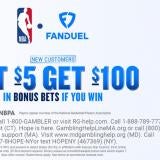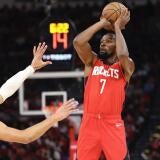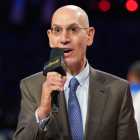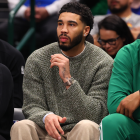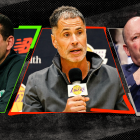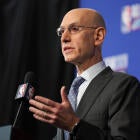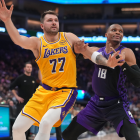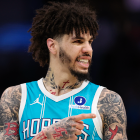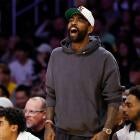
As LeBron James, Lakers wave the white flag, taking stock of Magic Johnson's missteps and charting a path forward
There is still a very plausible way for the Lakers to turn back into a championship-level team
There is an alternate, relatively reasonable reality in which this iteration of the Los Angeles Lakers becomes a middle-of-the-pack playoff team and at least scares someone in the second round. But for that to happen, just about everything would've had to go perfectly. LeBron James would've had to play 75-plus games in his 16th NBA season. The young guys would've had to grow, in unison, at an expedited rate. The ill-fitting mix of veterans would've had to turn back the clock. Bad shooters would've had to shoot well.
None of those things have happened.
They probably had no real chance of happening in the first place.
And here we are.
On Thursday it was reported that LeBron will be put on a minutes restriction for the remainder of a lost season, and he won't play back-to-back games. It's the official white flag. The Lakers know they're not making the playoffs. If you subscribe to the theory that there was another, more fruitful roster-building route available to them, they only have themselves to blame.
Hindsight is 20-20 with regard to the notion that they should've traded for Paul George when they had the opportunity, but who knows if Indiana would've done business with the Lakers. Besides, there was obviously strong reason to believe George was dead set on signing with the Lakers as a free agent anyway.
Give them a pass on that one.
But you can't just keep giving Magic Johnson and Rob Pelinka passes. They didn't put their best foot forward in an attempt to trade for Kawhi Leonard. They didn't go after DeMarcus Cousins, who wound up signing with the Warriors for barely $1 million more than the Lakers paid Lance Stephenson. They traded D'Angelo Russell, who became an All-Star, so they could draft and build around Lonzo Ball, a questionable enough selection before you even consider that Ball went one pick ahead of Jayson Tatum.
Sources close to the Anthony Davis failed-trade saga told CBS Sports that Tatum was, and probably remains, the single-biggest factor in New Orleans' decision to hold off on making a deal until the Celtics can come to the table with their best offer, which would presumably include Tatum, this summer. Sources say the Pelicans feel Tatum is the only young player to have been discussed in a deal thus far with top-10-player potential. Connect the dots, and had the Lakers just drafted Tatum, there's a very real, if not likely scenario in which the deal for Davis gets done and the Lakers, at this moment, are in legitimate title mode.
Instead, Magic and Pelinka drafted Ball and told him the franchise, effectively, was his, and that they expected his jersey was going to be hanging in the rafters one day. It wasn't all bad. Ball has perhaps been overly derided for his brief career that, shooting aside, has been pretty good. Everyone talks about the 17 games LeBron missed, but playing without Lonzo Ball has negatively impacted the Lakers in a very real way, particularly on the defensive end.
Remember that the Lakers also brought back the draft pick that became Kyle Kuzma in that Russell trade with Brooklyn. Getting Kuzma at No. 27 overall, and Josh Hart at No. 30, were two of the biggest steals of a 2017 draft that already looks to have been full of steals -- Donovan Mitchell at No. 13, John Collins at No. 19, Harry Giles at No. 20, OG Anunoby at No. 23, Monte Morris at No. 51. Give Johnson and Pelinka credit for Kuzma and Hart. Throw in Brandon Ingram (credit: Mitch Kupchak), and the Lakers, before LeBron ever came into the picture, were on a relative upswing.
They showed promise in 2017-18. Sources tell CBS Sports that Luke Walton, after his first season as coach, was excited about not just the Lakers' progress, but also the pace at which they were making it, and he quietly hoped they didn't try to "rush things." Needless to say, signing LeBron is the definition of rushing things. That's not to say Walton didn't want to sign James -- only that he knew what everyone else knew: The timeline had changed. Any leeway he might've once had was gone. He was about to become a scapegoat for a bunch of mistakes he didn't make.
In putting together a misfit group of free agents that immediately baffled just about everyone, a group wildly short on shooting that, per ESPN's Ramona Shelbourne, was sought out largely at LeBron's behest for additional playmakers, the Lakers' only semblance of a plan was their insistence on signing these free agents to one-year deals, so as to keep their books clean for a run at a second max free agent in the summer of 2019. This was a good strategy, but it could've been executed better.
We don't need to get into a laundry list of players the Lakers could've gone after, players/shooters that would've fit better alongside LeBron. Let's just say there were better options than Lance Stephenson, Kentavious Caldwell-Pope (who got the same money, and same one-year deal, as JJ Redick), Rajon Rondo, JaVale McGee and Michael Beasley. There was a way to better maximize the present without compromising the future.
Because at the end of the day, you don't sign LeBron to play entirely for the future, even one year into it. You don't just cash in the 16th season of a superstar's dwindling prime so you might be able to put together a better team in his 17th season. The Lakers had to know this was a unnecessarily weird team they were putting out there, and saying they were going to be patient was always misguided, if not an outright lie they sold to themselves and anyone else foolish enough to listen.
Indeed, that patience lasted all of eight games. With the Lakers sitting at 3-5 on Nov. 5, Magic was heated enough to call Walton into the principal's office for a little "get your act together" motivational lashing. With the Lakers in danger of missing the playoffs at the trade deadline, Magic and Pelinka reportedly offered basically the entire future of the organization to the Pelicans for Davis. There's not necessarily anything wrong with that. It's just not patient.
Patient would be waiting to land the max free agent this summer you seem to be so sure you're going to land, then negotiating with New Orleans with much more leverage and an in-place backup plan that already includes two stars and nice young core. The way the Lakers did it screamed we don't believe in this young core for anything more than a package trade asset. Whether you think the young Lakers have been over- or undervalued, there is mounting evidence that Magic and Pelinka aren't exactly the best in the business at evaluating such things.
In fact, one league source told CBS Sports he believes the Lakers are actually fortunate New Orleans didn't accept their offer. As great as Davis is, his contract would've restricted L.A.'s ability to sign a max player this summer. In that scenario, after a few more years of LeBron and Davis, having traded away all your young talent and multiple draft picks, what would you have left to put around Davis that would be better than the current New Orleans roster with which he's been unable to escape the second round?
The Lakers keep thinking these big names are going to flock to wear the purple and gold and play alongside LeBron, but that hasn't been the case. Again, George all but guaranteed he was coming to L.A., only to return to the Thunder without even giving the Lakers a meeting. Kawhi strongly hinted he wanted to end up with the Lakers, but after the LeBron signing he also backtracked. As he was forcing his way out of Minnesota, Jimmy Butler didn't include the Lakers on his list of preferred destinations. This notion that Kevin Durant or Klay Thompson is going to sign with L.A. is far-fetched at best. Same for Kyrie Irving.
The one thing the Lakers know for sure, and have known since July 2 of last year, is that they have LeBron James for a minimum of three seasons -- the first one of which has been, by just about any measurement, a total waste. That reality is frustrating for very obvious reasons, but if frustration is a product of outsized expectations, the Lakers -- given the roster they put around LeBron and the way they allowed their locker room to be compromised at the trade deadline -- should've seen this coming. They designed this whole thing in a way that called for LeBron, this deep in his career, to continue to be not just the best player in the league, but also one of the most durable players. Neither has happened.
Is there more blame to go around? Of course. LeBron has been about as defensively active this season as an old man doing a crossword. But again, isn't that on the front office? Had they really been watching LeBron sleep through the regular season in Cleveland only to determine he was going to just come over to the West, where life is exponentially more demanding on an every-night basis, and suddenly just start dominating on both ends every single night? That was a lazy, ill-advised strategy if so.
We have LeBron, so it will work out.
And if it doesn't, we don't really care about this year anyway.
That was never going to be true. Or at least it shouldn't have been. Everyone gets so excited by the fact that the Lakers were "threatening" for a top-four seed early in the season before LeBron went down. They were also two games from the No. 10 seed. They basically had one good stretch against mostly bad teams. There were, also, certainly questionable tactics on the part of Walton, his rotations for starters. But he's young. Like the Lakers as a whole. You either commit to development, or you look for shortcuts.
The Lakers tried to do both, and neither with anything that felt like a true commitment. One league scout told CBS Sports way back even when the Lakers were looking pretty good that the main problem was the "two different timelines" their roster was on. Half the guys needed time to develop, half the guys didn't have that time to waste. This is why you build a LeBron roster accordingly. Every single stop LeBron has made since leaving Cleveland in 2010 has come with two certainties: The coach he inherits is put on the hot seat immediately, and the young guys are put on the trade block. That the Lakers acted as if this was going to be different was another mistake.
Now there's only one question that matters.
Where do the Lakers go from here?
In addition to targeting Tatum as the main prize of a potential Davis trade, a league source told CBS Sports that the Pelicans believed all along the Lakers will be more than happy to offer the same package for Davis this summer that they offered at the deadline. Along with waiting for Boston's offer, the source said there is "more information" to be gleaned about players that could potentially be put in a Davis deal. Through that lens, it appears that Ingram's value has increased considerably. Since the deadline, the former No. 2 pick has more closely than ever resembled the star player he was projected to be when he entered the NBA.
If the Lakers are lucky the Pelicans didn't accept the initial offer, perhaps the Pelicans are regretting their decision. Whether Irving returns to Boston could very well depend on how the Celtics fare in the playoffs, and Irving's decision to stay or go could ultimately determine their willingness to offer Tatum in a deal for Davis, who could just walk away as a free agent the following summer.
This is all to say, Davis ending up with the Lakers this summer is still very much in play, particularly with the way Ingram has perhaps established himself, albeit in a relatively small sample, as the potential future top-10 player the Pelicans desire. The idea that Magic can pull off a deal for Davis after L.A. signs a max free agent this summer, which would give the Lakers an immediate three-headed super-team, is certainly conceivable. Keep in mind, the Lakers are going to have another lottery pick -- perhaps as high as a top-10 selection depending on how far this thinly veiled tank job gets them over the last month of the season -- to put in a potential Davis deal.
Bottom line, the Lakers, for all their missteps, are a solid bet to be a good team next season. They're going to have LeBron. They're going to have either their young core and their 2019 lottery pick, or the star player that trade package nets them -- if not Davis, then perhaps a Bradley Beal or the like. In addition, with their cap room, they're going to land either a second max free agent or a combination of at least pretty good players.
The risk is that the best version of any of those possibilities doesn't come through -- as it didn't this season -- and in that case, have Magic Johnson and Rob Pelinka done anything to prove they can put a championship team around LeBron without the ace that is LeBron falling into their laps? Even the most nostalgic of Magic fans would have a hard time answering yes to that question.


